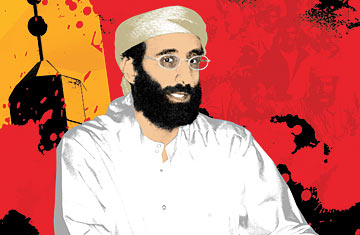
Anwar al-Awlaki
(3 of 3)
Terrorism Speaks Your Language
There are dozens of "e-imams" who preach hatred toward the West on the Internet, and some have greater clout among the faithful than al-Awlaki. But his books and CDs have become best sellers, and his YouTube sermons are getting hundreds of thousands of hits. The hype reached new heights recently when the Arabic-language news channel al-Arabiya dubbed al-Awlaki "the bin Laden of the Internet."
What distinguishes al-Awlaki is not his record; other preachers have had demonstrably closer links to al-Qaeda and jihad. It is his target audience. Al-Awlaki aims his sermons at young Muslims mostly living in the U.S. and Britain. This is a group he understands better than any other radical preacher. In his fluent English, he has become that rare specimen: the jihadist cleric who can communicate effortlessly with audiences in the West. His tone and his message can appear seductively conciliatory. Most of his sermons have nothing at all to do with radical ideology; they are simple translations from the Koran and stories about the life of the Prophet Muhammad. Al-Awlaki appeals to Muslim immigrants who worry that their English-speaking children are unable to connect to their faith. "He's lived amid such people, and he understands their dilemmas very well," says Jarret Brachman, author of Global Jihadism: Theory and Practice and former director of research at West Point's Combating Terror Center. "He's giving them an option, telling them, 'Here's how to be good Muslims when you don't have an imam to turn to.' "
Brachman, who monitors jihadist websites, reckons that al-Awlaki's sermons are "totally harmless nine times out of 10 ... but in the 10th, he starts to breathe a little fire." Much of the brimstone can be found in his blog posts, in which al-Awlaki states baldly that Islam and the West are in conflict and argues that all Muslims should join the holy war. In a how-to guide titled "44 Ways to Support Jihad," he says, "Jihad today is obligatory on every capable Muslim. So as a Muslim who wants to please Allah it is your duty to find ways to practice it and support it."
Most of the "44 ways" involve helping the mujahedin, or holy warriors: giving them money, praying for them, sponsoring their families and encouraging others to join the jihad. Believers are also urged to be physically fit, learn to use arms and spiritually prepare for holy war. Al-Awlaki stops short of telling his readers to go out and fight unbelievers. Instead, he suggests it is enough to have the "right intention" and to pray for "martyrdom." But later in 2009, al-Awlaki's tone grew more strident. "I pray that Allah destroys America and all its allies," he said in a blog post. "And the day that happens, and I assure you it will and sooner than you think, I will be very pleased." If al-Awlaki merely exhorted his audience to jihad, he might have gotten no more than passing attention from Washington. But intelligence officials and counterterrorism experts insist that he is no longer content to preach. His association with AQAP, which may be the terrorist network's most ambitious franchise, has brought al-Awlaki closer to the practice of terrorism. "Over the past several years, he has gone from propagandist to recruiter to operational player," a counterterrorism official tells TIME. "He is clearly moving up the terrorist supply chain."
The exact nature of al-Awlaki's operational role remains in dispute. "There's nothing to suggest that he's sitting down and planning attacks," says Ben Venzke of IntelCenter, a private intelligence contractor. "But his connections to Hasan and Abdulmutallab show that he does more than just make some jihadist literature available online. His role is more important than that." Granted, al-Awlaki lacks combat experience. But Pete Hoekstra, the ranking Republican on the House Intelligence Committee, believes that the cleric has a strong influence on operational issues. "He plays a role in setting a strategic direction for AQAP," he says. "He's telling them, 'Attacking the U.S. homeland should be one of our priorities.' " Is that reason enough for the U.S. to try to take al-Awlaki out? "Absolutely, yes," says Hoekstra. "This is a guy who is encouraging and organizing people to kill Americans." The counterterrorism official agrees: "Taking him off the street would deal a blow to [AQAP]."
That sounds reasonable. But even if the U.S. is right in identifying al-Awlaki as a present danger, getting to him won't be easy. Since the missile strike on his house, the preacher is thought to have gone into hiding among his tribe in Shabwa province. The Yemeni government, already burdened with its three civil wars, is unlikely to start a fourth with the al-Awlakis.
That leaves a U.S. drone strike as the most likely option. There is a precedent for that, but also an unpleasant reminder that al-Awlaki is not the first man brought up in the West — and will surely not be the last — who threw in his lot with jihadists. For in November 2002, one of the first ever drone operations took place in Yemen, killing, among others, Ahmed Hijazi, a suspected al-Qaeda operative. He was an American too.
— With reporting by Mark Thompson, Massimo Calabresi and Caitlin Duke / Washington; Rita Healy / Fort Collins; Teri Figueroa and Jill Underwood / San Diego; and Heather Murdock (GlobalPost) and Catrina Stewart / Sana'a
